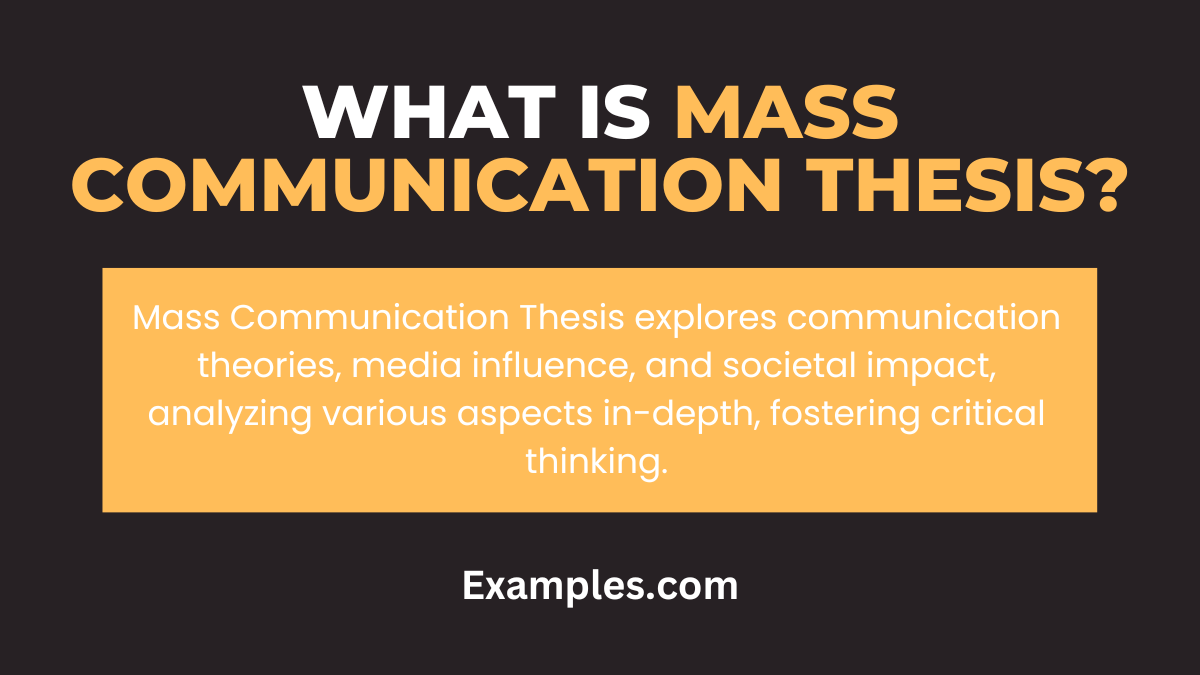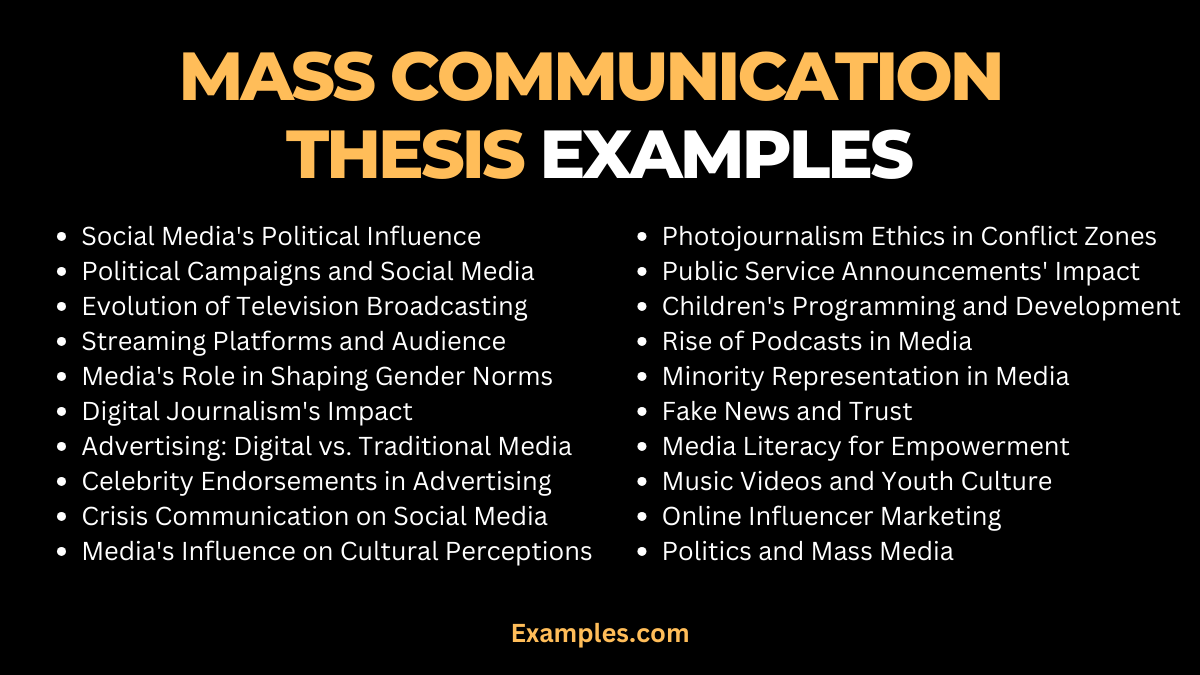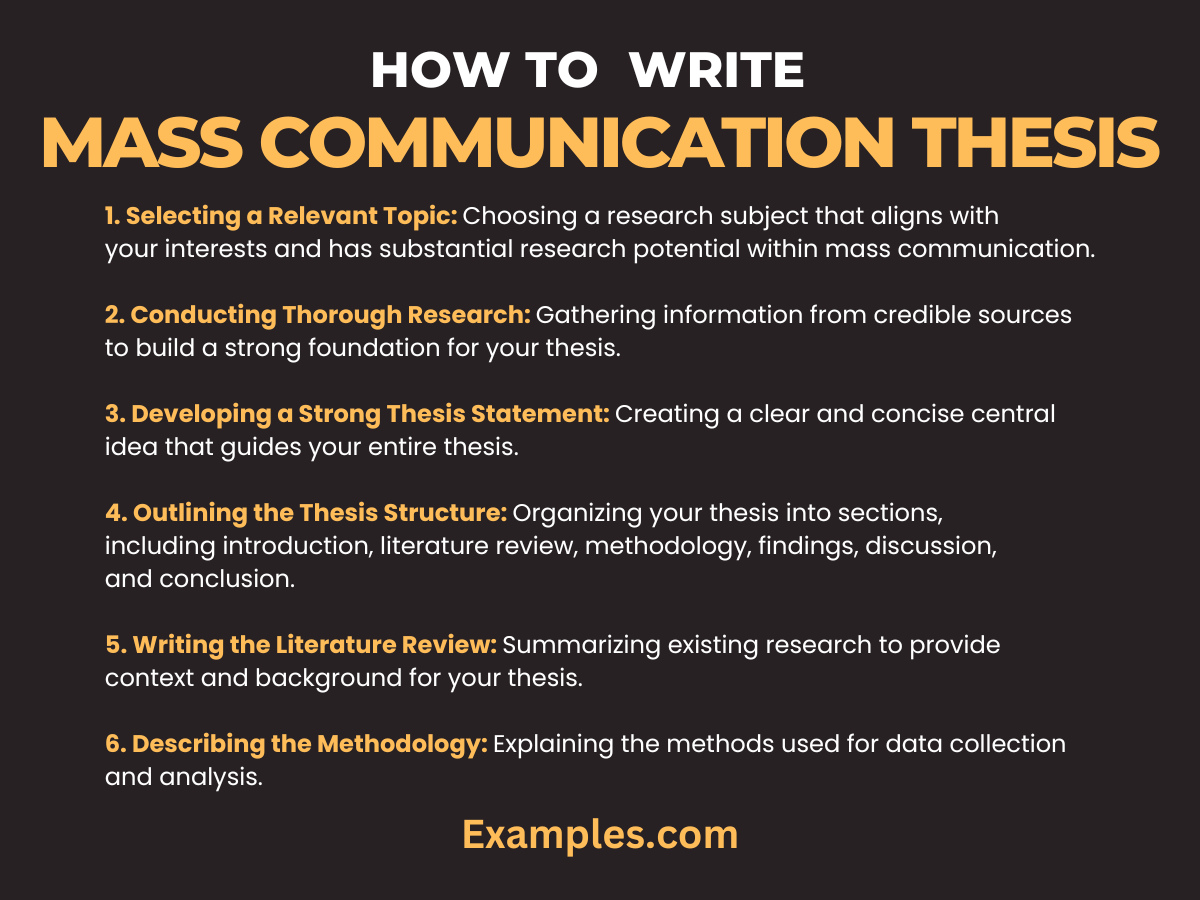19+ Mass Communication Thesis Examples
Understanding a Mass Communication thesis is key to excelling in communication studies. It involves in-depth research and analysis of how mass media impacts society. This guide offers a complete overview, providing clear definitions and meanings, along with practical examples. Whether you’re a student, researcher, or academic, this resource will enrich your knowledge of Mass Communication, offering insights into creating impactful theses and harnessing the power of media in contemporary society.
What is Mass Communication Thesis?

A Mass Communication thesis is an extensive research project focusing on various aspects of mass media and its effects on audiences and society. It involves rigorous study and analysis, often culminating in a substantial written work that contributes to the field of Mass Communication. The thesis may explore topics like media influence, communication theories, digital media trends, and the role of media in shaping public opinion. Understanding its definition and meaning is essential for students and researchers delving into the depths of media studies.
20 Mass Communication Thesis Examples

Exploring diverse aspects of Mass Communication, these thesis examples offer insights into the dynamic field, addressing contemporary issues and emerging trends. Each topic is carefully crafted, integrating key concepts like media influence, digital platforms, and audience perception. These examples serve as an excellent starting point for students and researchers aiming to delve into the intricacies of Mass Communication, fostering a deeper understanding of its impact on society and individual behavior.
- The Impact of Social Media on Public Opinion during Political Campaigns: Analyzing how social media platforms influence voter behavior and political discourse.
- How do political campaigns use social media to shape public opinion?
- Evolving Trends in Television Broadcasting and Audience Engagement: Examining the shift from traditional broadcasting to streaming services and its effect on viewer preferences.
- How have streaming platforms changed audience engagement with television content?
- The Role of Mass Media in Shaping Gender Norms: Investigating how various media forms contribute to the construction and reinforcement of gender stereotypes.
- In what ways do television shows reinforce traditional gender roles?
- Digital Journalism: The Transformation of News Consumption in the 21st Century: Exploring the transition from print to digital news and its implications for information accessibility.
- How has digital journalism affected the speed and spread of news?
- Advertising Effectiveness on Digital Platforms vs. Traditional Media: Comparing the impact of advertising on online platforms against traditional media like television and print.
- Which platform is more effective for advertising, traditional media or digital platforms?
- The Influence of Celebrity Endorsements in Mass Media Advertising: Analyzing how celebrity involvement in advertising campaigns affects consumer behavior and brand perception.
- How do celebrity endorsements influence consumer choices in advertising?
- Crisis Communication Strategies in the Age of Social Media: Studying effective communication methods used by organizations during crises, considering the speed and reach of social media.
- What strategies are effective for crisis communication on social media?
- The Effect of Film and Television on Cultural Perceptions: Investigating how movies and TV shows influence public understanding and opinions about different cultures.
- How do movies shape our perceptions of other cultures?
- The Ethics of Photojournalism in Conflict Zones: Exploring the moral responsibilities of photojournalists reporting from war-torn areas.
- What ethical considerations should photojournalists have in conflict zones?
- Public Service Announcements and Behavioral Change: Examining the effectiveness of PSAs in altering public behaviors and attitudes on health and safety.
- How do PSAs influence public behavior in health and safety matters?
- Children’s Programming and Its Impact on Early Childhood Development: Analyzing how television shows for children contribute to their cognitive and social development.
- In what ways do children’s shows contribute to their learning and development?
- The Role of Podcasts in Modern Media Consumption: Investigating the growing popularity of podcasts and their role in today’s media landscape.
- Why have podcasts become a popular medium in recent years?
- Representation of Minorities in Mainstream Media: Studying the portrayal of ethnic and racial minorities in television and film.
- How accurately are minorities represented in mainstream media?
- The Impact of Fake News on Public Trust in the Media: Exploring the consequences of misinformation and its effect on the credibility of news sources.
- What impact does the spread of fake news have on public trust in media?
- Media Literacy Education and Its Role in Empowering Audiences: Discussing the importance of media literacy in helping audiences critically analyze media content.
- Why is media literacy important for audiences today?
- The Influence of Music Videos on Youth Culture: Examining how music videos shape fashion, language, and behaviors among young people.
- In what ways do music videos influence youth culture?
- The Dynamics of Online Influencer Marketing: Analyzing how influencers affect consumer choices and brand popularity through social media.
- How do online influencers shape consumer behavior?
- The Intersection of Politics and Mass Media in Democratic Societies: Investigating the relationship between media coverage and political processes in democracies.
- How does media coverage affect political processes in democratic societies?
- User-Generated Content and Its Impact on Professional Journalism: Exploring the challenges and opportunities presented by the rise of citizen journalism.
- What impact does user-generated content have on professional journalism?
- The Globalization of Television Content and Cross-Cultural Exchange: Studying how the global distribution of TV shows facilitates cultural exchange and understanding.
- How does the globalization of television content promote cross-cultural understanding?
Each of these thesis examples opens a window into understanding the complex and ever-evolving world of Mass Communication, offering fresh perspectives and critical insights.
How to Write Mass Communication Thesis?

Writing a thesis in Mass Communication requires a structured approach and a clear understanding of the subject matter. Here are steps to guide you through the process:
- Choose a Relevant Topic: Select a topic that is both interesting to you and relevant to the field of mass communication. Ensure it has enough scope for research and analysis.
- Conduct Thorough Research: Gather information from credible sources like academic journals, books, and case studies. This will form the foundation of your thesis.
- Develop a Strong Thesis Statement: Your thesis statement should clearly express the main idea of your research. It serves as the guiding framework for your entire thesis.
- Outline Your Thesis: Create an outline to organize your thoughts and structure your thesis. This should include an introduction, literature review, methodology, findings, discussion, and conclusion.
- Write the Literature Review: Review existing literature to provide context and background for your thesis. This should reflect a deep understanding of the subject and its current state.
- Describe Your Methodology: Clearly explain the methods used for data collection and analysis. This could include qualitative, quantitative, or mixed-method approaches.
- Analyze and Discuss Findings: Present your data and discuss what it means in the context of your thesis statement. This should be an objective analysis of the results.
- Conclude with Implications: End your thesis with a conclusion that summarizes your findings and discusses their implications in the field of crisis communication and beyond.
Thesis Ideas for Mass Communication
When choosing a topic for your Mass Communication thesis, consider areas that are both contemporary and have a significant impact on society. Here are some ideas:
- The Role of Social Media in Crisis Communication: Analyze how social media platforms are used to manage communications during crises.
- Impact of Fake News on Public Opinion: Explore how misinformation affects public perception and decision-making.
- Media Coverage and Public Perception of Global Pandemics: Investigate how media reporting on events like COVID-19 influences public response and behavior.
- The Evolution of Advertising in the Digital Age: Examine how digital platforms have transformed advertising strategies and consumer engagement.
- The Influence of Mass Media on Political Campaigns: Study how mass media coverage affects the outcomes of political elections or campaigns.
- Ethical Considerations in Journalism: Discuss the ethical dilemmas faced by journalists in the modern media landscape.
- The Effectiveness of Public Service Announcements: Evaluate the impact of PSAs on public awareness and behavior change.
- Cultural Representation in Mass Media: Analyze how different cultures are represented in various media forms and the impact on cultural perception.
In summary, crafting a Mass Communication thesis requires careful selection of a pertinent topic, thorough research, and a structured approach. By following these guidelines and tips, you can effectively communicate your insights and contribute valuable knowledge to the field. Whether exploring crisis communication or other areas, your thesis has the potential to impact and shape the understanding of mass communication dynamics.



